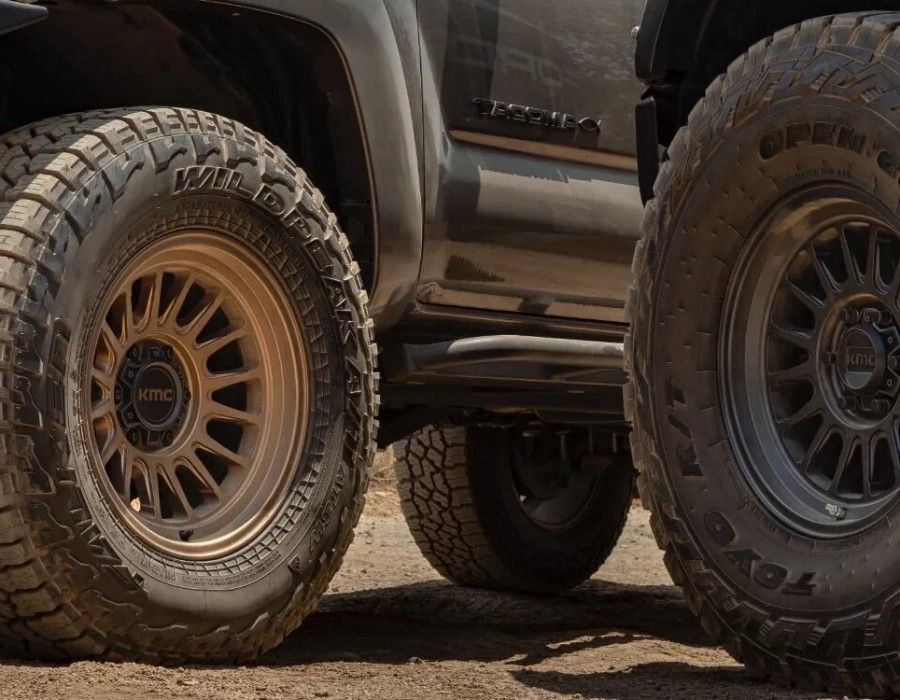When you buy a car, the wheels are an essential part of your car. These wheels are designed to offer verity and a smooth ride on even, paved surfaces. If you want to enjoy exploring areas beyond the normal roads, off-road wheels may be the best choice for you. So, here we will learn which wheel is good for you: off-road wheels or stock wheels. Can they preserve the safety and performance of the vehicle? Let's investigate.
Stock Wheels
Stock wheels are the wheels that usually come with brand-new cars. These are the wheels that the producer chooses as standard equipment for a particular model. Stock wheels are also commonly known as OEM wheels because they were created by the original car manufacturer.
Off-Road Wheels
Off-road wheels are made for off-road vehicles who want to travel off-road or over rugged terrain. These wheels are designed to traverse difficult areas such as mud dunes, rocky roads, dirt trails, and more. Off-road tires typically have reinforced sidewalls to protect against punctures and damage from obstacles such as sharp pebbles.
Stock Wheels or Off-Road Wheels
Building Materials
Two metals are used to make stock wheels. Alloy wheels, which are composed of several different metals, are lighter in weight. They provide high heat dissipation, making them ideal for daily driving. Although steel wheels are heavier than their alloy counterparts, they are also more durable and less expensive.
Off-road wheels are often made of best materials to withstand the rigors of off-road conditions. They are often made of reinforced steel or special alloys that can handle the impact of rocks, gravel, and other rough terrain.
Weight and strength
Stock wheels are lightweight for better handling and fuel efficiency but It gives you power.
Off-road wheels are heavier and more sturdily built than on-road wheels. They are built to withstand the harsh demands of off-roading, including negotiating dirt roads, mud, and sand. Off-road tires typically have reinforced sidewalls to protect against punctures and damage from obstacles such as sharp pebbles.
Size and width
Stock wheels are often wider in diameter and narrower, that way they give you a smoother ride and higher highway fuel economy.
Off-road wheels often have wider rims to fit bigger and more prone off-road tires. On rocky terrain, the wider base offers more traction. Larger-diameter wheels can be useful for clearing obstacles.
Tire Compatibility
The advantage of stock wheels is that the carmaker has designed them specifically for the car, which guarantees a good fit and compatibility.
Off-road wheels are designed to go with off-road adventure. These tires can provide good traction on hard terrain because they have a deeper and often wider tread. Off-road wheels must be compatible with the vehicle's suspension and braking system and must not rub against the vehicle's body or other parts.
Design and Appearance
Stock wheels are made to enhance its overall look and design. They are found in different styles of finishes, including polished, painted, or machined.
Off-road wheels' priority is functionality rather than appearance. Their priority is functionality rather than appearance. While some off-road wheels are stylish, their main design goals are durability and performance.
Comfort and handling
The comfort and handling properties of the stock wheels are best and have been rigorously tested by the car manufacturer as they are an integral element of the vehicle's original design. These tires are designed to perform on roads. They ensure stable handling and stability of a fast-moving vehicle.
These wheels are designed for achievement in rough conditions. In slippery or uneven terrain, their shape promotes stability and improves traction.
Costs and Maintenance
Because they are mass-produced for stock automobiles, they are generally less expensive. They demand less maintenance as they face less aggressive conditions. Regular cleaning and occasional balance and alignment checks are sufficient.
Due to the tougher materials used and special production techniques, they are generally more expensive. Need more attention. After a rough trail, they should be inspected for damage or dents. It is also important to ensure that they remain free of trapped debris. Off-road wheels are designed for durability. They can handle rough terrains, impacts from rocks, and other stresses associated with off-road adventures.
Final Words
Off-road and stock wheels are primarily used to support the car's tires. The purpose, design, and manufacture of each wheel are unique. Stock wheels provide a premium on a smooth ride, fuel economy, and highway- and city-road-appropriate design. For individuals who enjoy the rush of overcoming treacherous terrain, off-road wheels are all about performance, strength, and longevity. Depending on your driving requirements, you can choose any of the two wheels. Using your conventional wheels should be adequate if you occasionally travel on rural roads while driving in urban areas. Purchasing top-notch off-road wheels could be advantageous if you prefer off-road driving. This can dramatically increase your vehicle's overall performance, safety, and lifetime.





Comments